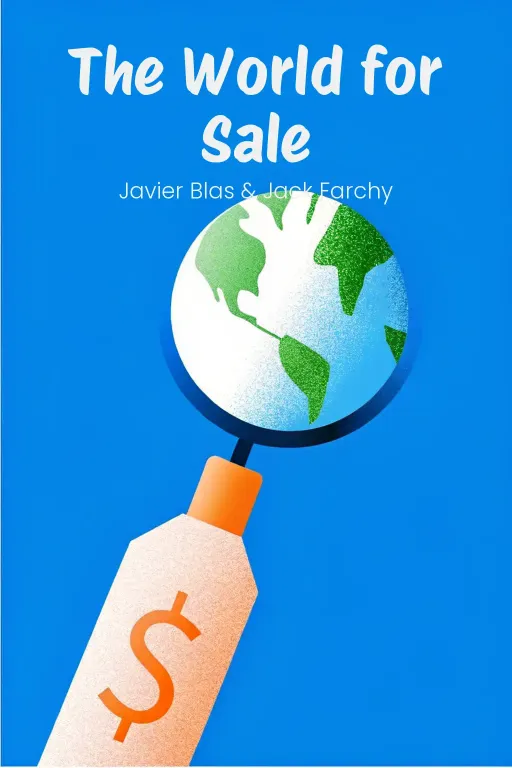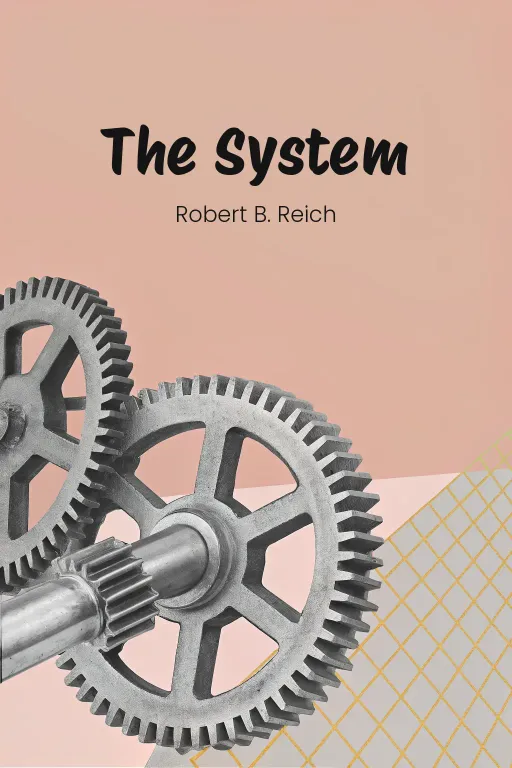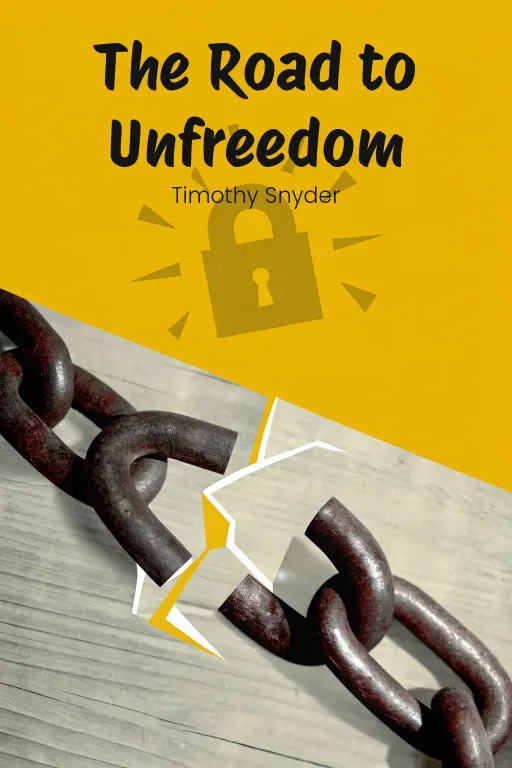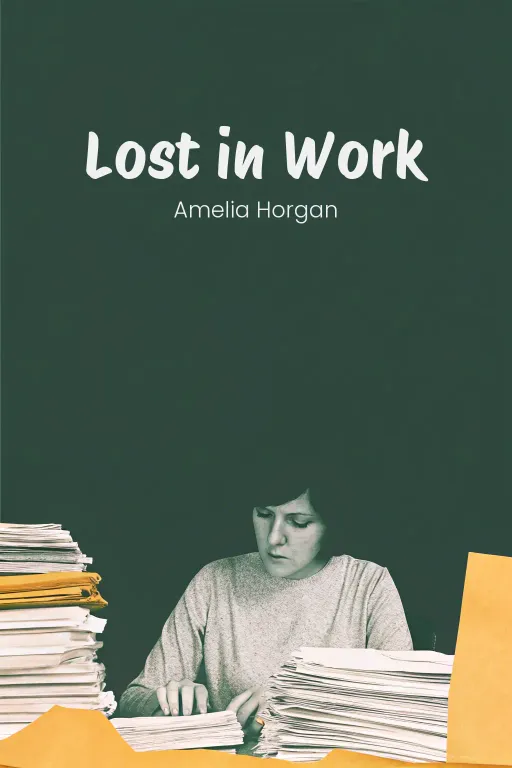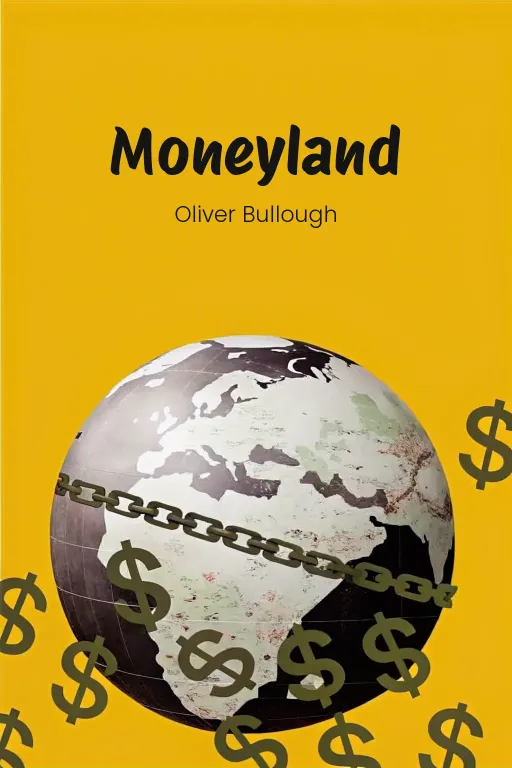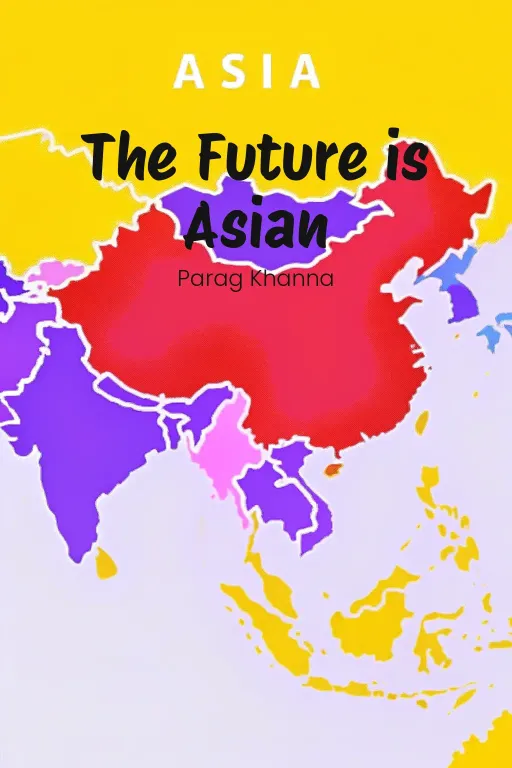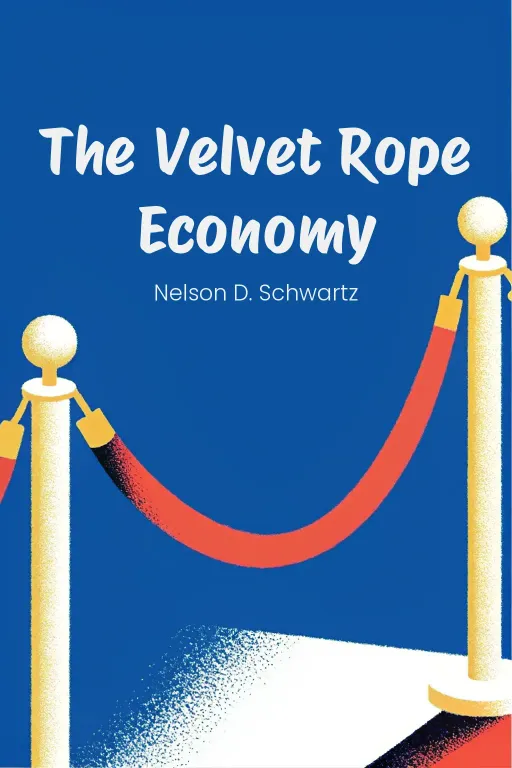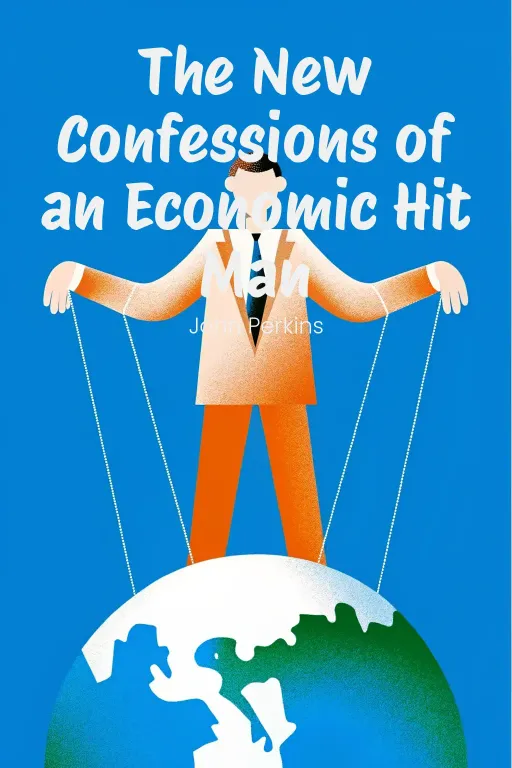
Fixing Problems or Polishing the Image?
Podcast by Let's Talk Money with Sophia and Daniel
The Elite Charade of Changing the World
Fixing Problems or Polishing the Image?
Part 1
Daniel: Hey everyone, welcome back! Today’s a big one: Can the very people benefiting from inequality actually “fix” it? Sophia: Or, to put it a bit more… bluntly, if you’re making money off the problem, can you really be trusted to solve it? Daniel: Exactly! We're diving into Anand Giridharadas’s book, Winners Take All: The Elite Charade of Changing the World. He really takes a critical look at wealthy elites who promote market-based "solutions" to social problems, but conveniently ignore – or, honestly, make worse – the underlying issues. Sophia: Right, it’s like pushing someone into the deep end and then saying, "Hey, I’ve got a great deal on a swimming lesson!" Daniel: Precisely! Giridharadas calls this “MarketWorld"— this belief that free-market principles can solve everything. The problem is, they often just reinforce the inequality. Sophia: And sometimes this philanthropy, well, it feels more like reputation management. Daniel: That's part of what we're going to unpack today. We will look at three layers of this “elite savior” complex. First, we'll break down the problematic ideology of MarketWorld and why profit-driven solutions usually fail to address the real, systemic problems. Sophia: Then we’ll dig into what elite philanthropy often masks – it’s not always just about being generous, is it? Daniel: No, definitely not. And finally, we’ll talk silver linings: What grassroots movements and real democratic participation can actually achieve. Sophia: So, think of this episode as stripping away the fancy facade to see what's really holding things up. True change? It’s way more complicated than a TED Talk or a swanky charity event. Daniel: Exactly, let’s get into the reality behind the headlines.
MarketWorld and Elite-Driven Change
Part 2
Daniel: So Sophia, let’s get into this MarketWorld thing, starting with what it’s all about. Giridharadas doesn’t hold back when he takes apart the idea that capitalism’s tools – things like entrepreneurship and investments – can somehow fix the problems that capitalism itself causes. Sophia: Right, he's really going after it. It's like saying the arsonist can put out the fire. Daniel: Exactly! And it’s so tempting, right? MarketWorld promises you can “do good” while “doing well.” This idea that you don’t have to pick between profit and helping others – they can work together. That’s the idea, but Giridharadas is warning us how wrong that is. Sophia: Yeah, the classic "win-win." It reminds me of those late-night ads: "Buy this blender and save the rainforest!" Meanwhile, the blender factory is polluting a river. So how does this actually show up in the real world? Daniel: A big one is corporate social responsibility, or CSR. Companies donate money, organize charity events, or support big causes. It looks great, but it rarely challenges the deep problems in the system. Giridharadas talks about Stacey Asher and her “Portfolios with Purpose” platform, which encourages rich investors to use their money skills for good. Seems perfect, right? Sophia: Okay, let me guess, peel back one layer and it's just... greenwashing? Daniel: Exactly! CSR is more about image than real change. A company might be running charity drives while underpaying their workers or destroying the environment. Giridharadas says these nice gestures actually make things worse by making the company look like a hero, and the real problems get ignored. Sophia: Right, it's the ultimate distraction. "Look over here, not over there." If a company gives millions to an environmental cause while profiting from practices are harmful, are we missing the real problem? Feels like the arsonist is also selling fire extinguishers. Daniel: Exactly the point. CSR, even things like impact investing, are sold as solutions. Take green bonds, which he talks about in the book. They fund environmentally friendly projects, like solar energy and on the surface, seem groundbreaking. Sophia: Ah, there's a 'but' coming. What's the catch? Daniel: They rarely question the bigger economic systems that cause environmental problems in the first place. A company might issue green bonds for solar projects, but still make most of its money from fossil fuels. It's treating the symptoms, not the cause – or even profiting from it. It’s about looking good without fixing anything. Sophia: Okay, playing devil’s advocate here. Even if a company issues green bonds and is genuinely trying to do better, isn't a little progress better than nothing? Are we at least nudging the needle? Daniel: It’s a fair point, a lot of people struggle with this. But the illusion of progress is the problem, distracting us from real change. If a company gets praise for green bonds but lobbies against stronger environmental rules, they are dodging accountability. Not moving the needle, keeping the clock stuck. Sophia: Got it. It’s like slapping a fancy sticker on a broken appliance and calling it new, instead of actually fixing it. Speaking of broken systems, what about these "changemakers?" People like Hilary Cohen—she seems like the perfect example of what happens when people buy into MarketWorld’s ideas. Daniel: Exactly. Hilary starts out wanting to make a difference. Straight out of Georgetown, she joins a consulting firm, thinking business is the best way to change the world. But she realizes that the business strategies don’t even begin to address the real roots of inequality. Sophia: So she goes in thinking she can fix it and... ends up just another part of the machine? Daniel: Exactly. Giridharadas calls this one of MarketWorld’s most sneaky tricks. People like Hilary, who mean well, are taught to see inequality as a puzzle to be solved without ever questioning who made the puzzle. She adjusts to the system instead of challenging it, focusing on individual success and quick fixes instead of real change. Sophia: And so the people who are actually affected by inequality, the ones on the ground, are left out of the conversation entirely, right? Instead of real participation, we get solutions handed down from above. Daniel: Exactly. These “changemakers” become the face of MarketWorld, selling the idea that private business will save the day. But by shutting out grassroots efforts and ignoring democracy, they keep power in the hands of the elite. Sophia: It’s like hiring the same CEO who outsourced your job to lead a campaign promising new jobs. Irony overload. Daniel: It gets even worse when you see how MarketWorld uses technology. Giridharadas talks about things like the app Even, which helps gig workers manage unstable incomes. It’s a creative tool, but it doesn’t address why these workers face unstable pay, like low wages or bad hiring practices. Sophia: Instead of fixing the house, they are selling umbrellas? Brilliant and bleak. Daniel: Exactly. MarketWorld offers band-aids instead of fixing the system. That’s why Giridharadas keeps asking: can the elites, who benefit so much from the way things are, “really” lead the way for meaningful change? And he answers with a clear no.
The Paradox of Elite Philanthropy
Part 3
Daniel: So, Sophia, that leads us to the paradox of elite-led philanthropy and its limitations. It’s not just about flawed market solutions – it’s about how philanthropy itself can become a tool to “sustain” inequity rather than, you know, actually fix it. Sophia: Right, so it's not just unintentional, it's almost... by design? Daniel: Precisely. Building on the critique of MarketWorld, this section really dives into philanthropy’s contradictions – how it so often masks harm, preserves power, and skirts any kind of real systemic reform. And, you know, a perfect example is the Sackler family. Sophia: Ah, the Sacklers – philanthropy rockstars and public health villains all rolled into one. What a combo, eh? Daniel: Exactly! They owned Purdue Pharma, the company behind OxyContin. And, through, shall we say, “aggressive” marketing, they downplayed its addictive potential. This unleashed a wave of over-prescription and addiction, driving the opioid epidemic with devastating consequences in communities all over the U.S. Take McDowell County, West Virginia – entire families were torn apart. Addiction rates soared, leading to economic ruin and countless deaths. Sophia: And while leaving that kind of destruction in their wake, they were plastering their name across museum walls and university research centers, weren't they? I mean, what a legacy. Daniel: Exactly. Their philanthropy channeled billions into prestigious cultural, educational, and scientific institutions. You'd see their name in museums like the Met or on wings of world-famous hospitals. It all served to brand them as benefactors of society, rather than really confronting their role in fueling one of the most catastrophic public health crises in history. Sophia: So, if I am understanding this correctly, the same folks whose product devastated small-town America were being lionized as patrons of high culture? That's... well, let's just say it doesn't sit right. Daniel: It shouldn't. I mean, their giving wasn't just “tarnished” by their harmful practices – it actively worked to distract people from them. Winning public admiration through philanthropy, they avoided accountability and kept their status and privilege intact. Giridharadas calls this the "moral escape route" of elite giving – it allows the wealthy to sidestep any reckoning with the systemic harms of their actions. Sophia: Meanwhile, institutions that took their money – museums, universities – aren't they complicit in this charade? Should they be more responsible, maybe even bearing some moral responsibility? Daniel: To an extent, yes. When institutions accept these donations without questioning the source or the conditions, they become part of a power dynamic that legitimizes elite dominance. They're allowing their platforms to be used for image laundering. And, this isn't just about the Sacklers, this dynamic runs deep across elite philanthropy. Sophia: Which brings us to Darren Walker's critique, right? He's, like, an insider in the philanthropy world, but even he doesn't hold back. His point is that these acts of generosity often just reinforce the status quo, yes? Daniel: That's right. Walker discusses his journey from humble beginnings to commanding a prominent position in global philanthropy as president of the Ford Foundation. He reflects on how much of elite giving, rather than addressing the “root” causes of poverty or disenfranchisement, shifts focus to surface-level solutions. Walker calls out the way charity often frames inequality as an individual misfortune rather than a systemic failure that really requires redistribution of power and resources. Sophia: It’s that whole illusion of benevolence, isn’t it? You swoop in, donate a wad of cash, and suddenly everyone overlooks the structural machinery that keeps disparities in place. It’s like putting sunglasses on a dragon and calling it a peacekeeper. Daniel: That's a colorful metaphor, Sophia, but it fits. Walker emphasizes that wealthy donors tend to resist any effort that would actually make philanthropy less... necessary – like fair taxation, labor protections, or dismantling monopolies. Instead, they define the terms of social change in ways that simultaneously elevate their image and preserve their privilege. Sophia: And they do it with just enough generosity to keep the public's attention off the real problems. Classic. Daniel: Exactly. Take the concept of "impact investing," for instance. On the surface, it sounds like the perfect marriage of altruism and capitalism. Investors fund projects geared toward social or environmental goals, like renewable energy or poverty alleviation, all while earning a return. But Giridharadas critiques this model as being riddled with contradictions. Sophia: Hmmm... I'm guessing it's another “band-aid solution?” What's the fine print on this one? Daniel: Well, take those green bonds we touched on earlier. They raise money for sustainable projects, sure. But often, the companies issuing them are guilty of egregiously harmful practices elsewhere – companies that may still rely on fossil fuels, for instance. So these bonds don't challenge or dismantle the structural drivers of climate change. They just offer a feel-good story for investors while leaving the tougher systemic questions unanswered. Sophia: So, it’s almost like setting up a lemonade stand in front of a burning building but refusing to call the fire department. Sure, the lemonade might help in the short term. But it doesn’t stop the house from burning down. Daniel: Perfect metaphor. Giridharadas points out that this approach creates complacency. It allows us to believe we’re making progress, when in reality the deeper structural inequities – both economic and environmental – go unaddressed. That illusion of progress can be as harmful as outright inaction. Sophia: You are suggesting that complacency brings us back to the central critique of elite philanthropy. That would be: it plays on optics instead of tackling root causes. Because this reinforces the seductive "win-win" narrative again, isn't it? That "doing well by doing good" mantra. Daniel: Absolutely. And this is where Giridharadas is so incisive. He doesn't just highlight what philanthropy does poorly; he shows how, structurally, it fails to engage with systemic change. To truly serve the public, it would mean elites giving up power – not just redistributing capital on their terms, but creating space for democratic governance and grassroots leadership. Sophia: Let me just stop you there for a second. Because what you're really saying – and I think Giridharadas would agree – is that philanthropy, as it exists now, isn't just insufficient, it's more like... counterproductive. It soothes just enough unrest to keep everything else running as it always has. Daniel: Exactly.
Grassroots Activism and Structural Reform
Part 4
Daniel: This critique naturally leads us to the question: what “are” the alternatives for real change? It's not enough to just point out the flaws in elite philanthropy or the MarketWorld ideology. Giridharadas, in the final chapters of Winners Take All, really pushes for a solution-oriented approach. That means focusing on grassroots activism and actual structural reform, you know, a way forward that goes beyond the superficial fixes offered by the elite. Sophia: A solution-oriented perspective, huh? Sounds promising. But let me guess: it's gonna require more than just throwing money at the problem, right? Real effort involved? Daniel: Absolutely. The solutions Giridharadas proposes are more democratic, more inclusive, and crucially, they aim to redistribute power back to the people. He highlights platform cooperativism as a way to disrupt corporate hierarchies in the digital economy. Instead of Uber or Airbnb dominating the gig economy, imagine the workers owning and running these platforms themselves Sophia: Okay, I'm intrigued. Platform cooperativism, though – let's break that down. What does that actually look like? Are we expecting drivers to suddenly become tech engineers overnight or something? Daniel: Not exactly. Picture this: Uber isn't owned by a handful of executives and shareholders; it's owned collectively by its drivers. Decisions about pricing, wages, policies – they're all made democratically by the people whose labor creates the platform's value. It flips the current structure, where workers are often classified as "independent contractors" with few rights, while the company remains in control. Sophia: So, instead of being cogs in someone else's machine, they build and run their own machine. I like the ambition. But, does this actually work? Can a driver-owned app really compete with a multi-billion-dollar tech company? Daniel: That's the big challenge, of course. Giridharadas isn't suggesting it's a walk in the park. But there are success stories. The Drivers Cooperative in New York City, for example, was launched in response to the exploitative practices of ride-hailing giants. It's owned by the drivers, and while it's still small compared to Uber, it proves that a more equitable digital economy is possible. Sophia: These cooperatives aim to dismantle the conventional hierarchy. Is it scalable, though? Taking on the Ubers and Airbnbs of the world sounds like David versus Goliath. Daniel: It is, and scale is definitely an issue. But the point is that these cooperatives prioritize fairness over market dominance. Giridharadas argues that it's not just about "beating" these massive corporations at their own game. It's about questioning why the game had to revolve around centralization and exploitation. These platform cooperatives might not rival Uber tomorrow, but offer an alternative model that aligns more closely with equity and democracy. Sophia: Hmm, disruption, not domination. Got it. You mentioned earlier that Giridharadas also critiques the reliance on tech-driven fixes. Is platform cooperativism entirely immune to the same traps he warns against? Daniel: Not entirely, no. Technology alone isn't the solution; it's one tool for redistributing power. That's why Giridharadas also emphasizes the role of political engagement and robust public systems, alongside grassroots economic initiatives. Public institutions can enforce fairness and provide for everyone far better than private sector cooperatives could—something tech solutions simply can't achieve on their own. Sophia: Okay, that brings us to the role of public systems. Finally, we're talking about the government stepping up and doing its job, huh? Daniel: Exactly. Giridharadas is critical of the trend of relying on private philanthropy to fill the gaps left by underfunded public systems. He argues that instead of outsourcing social progress to billionaires or corporations, we need to reinvest in democratic governance. Things like fair taxation, redistributive policies, robust safety nets. Sophia: It's like saying instead of buying a golden ladder for a select few, use public funds to repair the infrastructure so everyone has a bridge to cross. Here's my question: why does this fall on deaf ears? Why do so many politicians, or elites, shy away from strengthening public systems? Daniel: Giridharadas argues it's because it threatens their power. Public systems, by design, are accountable to everyone, not just the wealthy. Strengthening them would mean the ultra-rich have to cede some control. Take fair taxation. Instead of relying on voluntary donations or "impact investing," a progressive tax system ensures resources are redistributed equitably. That's exactly what many elites lobby to avoid. Sophia: Right. “We're all in this together,” offshore tax havens and loopholes. Of course. Let's tie this to what grassroots activism offers. How does it fit in? Daniel: Grassroots movements are crucial for pushing systemic change from the bottom up. Unlike elite-driven solutions, they're rooted in lived experiences – people directly impacted by inequalities coming together to demand justice. Giridharadas sees these movements as essential for holding both private and public power accountable. Sophia: We're talking protest movements, unions, local councils? What does grassroots activism look like on the ground? Daniel: All of the above. Take rideshare drivers, for instance. Beyond platform cooperativism, many have mobilized around unionization and labor rights. These movements demand fundamental changes – reclassifying gig workers as employees, entitled to minimum wage, benefits, and protections. The difference: this isn't change imposed by elites offering "shock absorber" solutions; it's people defining their own needs and pressuring governments to act. Sophia: It's not just about asking for a seat at the table – it's about flipping the whole table over when needed. Can grassroots movements sustain momentum without billionaire or institutional backing? Daniel: They can, but it requires strategic organizing and broad public support. The Civil Rights Movement, for example, wasn't built on the generosity of elites, but on relentless activism from ordinary people. Giridharadas argues that true social transformation requires amplifying these efforts, combining them with robust public policies that institutionalize change. Sophia: So we're talking about collective power, scaling democracy, and reinforcing public systems. The more inclusive and participatory these movements become, the harder they are to stop. Daniel: Exactly. By empowering marginalized voices and investing in democratic structures, grassroots activism and public governance work to dismantle entrenched inequalities. Sophia: Alright, the bottom line. Giridharadas is saying we need fewer saviors and more solidarity. Elites can't lead meaningful change because the system benefits them too much. The real path forward lies with collective action and systemic reform. Daniel: Right. By centering people, not profits or power, we come closer to building a society that doesn't just manage inequality, but actively prevents it.
Conclusion
Part 5
Daniel: Okay, so today we really dug into Anand Giridharadas’s, uh, pretty intense critique of MarketWorld, right? You know, elite philanthropy and this whole idea of "win-win" solutions. We looked at how things like impact investing, which sounds so great, and even the good deeds of billionaires, can actually protect the very systems they're supposedly trying to fix. Sophia: Yeah, it's like, are they actually solving problems, or just, you know, putting a fancy band-aid on a gaping wound? And we also talked about some alternatives, things like platform co-ops, real grassroots activism, and putting money back into our public systems. Instead of just trying to make the current system a little better, how about we shake things up completely, redistribute power, and build systems that actually include everyone? Daniel: Exactly! And I think the core of Giridharadas’s argument is really challenging us to look past this savior complex that elites sometimes have, and to really have faith in what we can do together. Because real change, the kind that actually transforms things, doesn't trickle down from the top – it grows, it builds from the bottom up. Sophia: So, the next time you see some billionaire dropping a ton of cash on a new museum wing or, you know, some fancy green initiative, maybe ask yourself: are they seriously tackling the root causes of inequality, or are they mainly just making things look a little nicer from the outside? Daniel: Right, and even more importantly, where can we put our energy to support the movements happening at the local level, to push for changes in how our systems work, and to really hold those in charge accountable? Change isn't something that's going to just be handed to us, we have to, you know, stand together and, and lead the way ourselves. It’s on us. Sophia: Because at the end of the day, a united front – solidarity – always wins out over waiting for someone to save us. So, thanks for tuning in, everyone. Keep thinking critically about the stories we're told about who's "saving" our world, okay?
